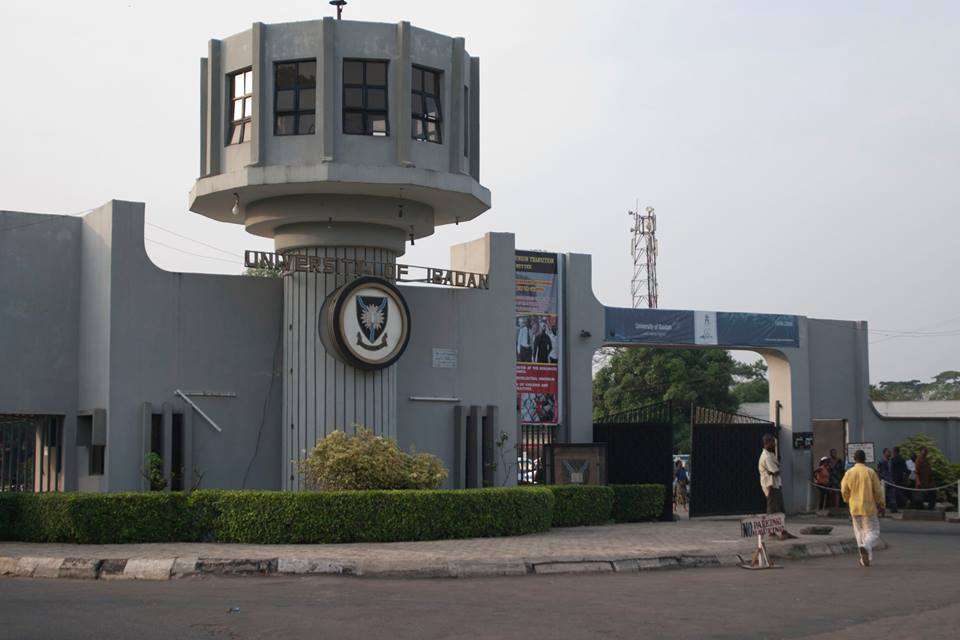The University of Ibadan, UI, on Tuesday 31 July 2018, at the 2nd Geoffery Axworthy Lecture renamed its 63 year old Unibadan Arts Theatre after the Nigerian born literary icon and Nobel Laureate, Professor Wole Soyinka.
The aged arts theatre will now be known as “Wole Soyinka Theatre”.
The programme was almost marred when the guest lecturer, Professor Ahmed Yerima slumped while delivering his paper. He was revived and later rushed to the institution’s health centre in an ambulance. However, the master of ceremony, Longley Evru, who promptly noted, “the show must continue”, helped the lecturer to read the concluding part of the paper.
In attendance were the alumni and prominent products of the Department of Theatre Arts, Professors, J. P. Clark, Femi Osofisan,Dan Izevbaye , the institution’s principal officers including Deputy Vice Chancellor (Administration), Prof. Kayode Adebowale, DVC (academic), Prof. Adeyinka Aderinto, the Registrar, Mrs. Olubunmi Faluyi, the university Librarian, Dr. Helen Olubukunola Komolafe Opadeji and others.
Soyinka, who was presented a bottle of wine by the organizers, appreciated the honour bestowed on him by the institution.
In his welcome address, the Vice Chancellor, Prof. Abel Idowu Olayinka stated that the institution has made it a culture to honour the university’s heroes and icons not only for the great work they have done to the university in the past but for giving the institution global recognition.
According to him, Soyinka deserves every honour the institution could bestow on him giving his contribution to the institution, Nigeria and the world at large.
In the same direction, the Head, Theatre Arts Department, Prof. Matthew Umukoro who noted that Soyinka is a global icon for scholarship and creativity pointed out that re-naming the Arts building after the literary icon was a befitting honor to the one that has brought so much honour to the university.
He said, “Our vision has been to see the Arts Theatre transform into Wole Soyinka Theatre, expanded and modernised to meet the technical and technological challenges of the twenty-first century. We intend to take the dream further by launching a Wole Soyinka Theatre Endowment Fund to raise the capital required for actualising our goal. We are also happy that Geoffrey Axworthy, the literary mentor of Wole Soyinka is also being doubly honoured with the renaming of the Practical Theatre as Geoffrey Axworthy Studio”.
In his paper titled, “Geoffrey Axworthy and the Modern Nigerian Theatre”, Yerima who practically eulogized Axworthy all through noted that Axworthy met a fledging Nigeria with a lot of young artistically creative and brilliant minds. He said that Axworthy was impressed with the rich cultural history and the evident cultural diversity of the country’s major tribes, adding, “Coming from a similar British culture of magical stories and wonderful world of communal theatre, Axworthy knew that a proper blend and exploration of the cultural content of performances would make theatre emotionally moving and thematically satisfying and relevant to the growing Nigerian nation. He acknowledged the existence of early performative activities, communal theatre activities, and sought ways to find a synergy, which would enable the town to benefit from the gown, without each one losing its original essence”.
According to him, Axworthy was also aware of the early efforts of young creative minds such as J.P Clark, Christopher Okigbo and the Mbari efforts at the time stressing that Axworthy did not meet a creatively dormant Nigeria.
He listed some of the contributions of Axworthy to the development of Nigerian theatre to include: influencing the policy development and implementation, which invariably affected the growth and development of Nigerian drama, championing the takeoff of a drama programme at Ibadan in conjunction with friends and co-workers like Martin Banham, Ulli Beier, Professor Molly Mahood, Derek Bullock, encouragement of adaptation of prose works for the stage, encouragement and development of the total Nigerian theatre technique, and evolving of a well-structured theatre programme at the University of Ibadan, which is still the leading programme of theatre in the country today.
He continued, “As a teacher, theatre practitioner, and scholar, Axworthy touched the lives of the students of the university and their private theatre groups…After leaving Nigeria in 1967, both Axworthy and Martin Banham, continued to make significant contributions to the development of Nigerian drama”.
Yerima pointed out that Axworthy had to leave Nigeria in 1967 because of lack of qualitative healthcare for his wife quoting Axworthy, “My wife (Irene Dickinson) became very ill and died when we got back. I had to leave because the treatment for her was not available in Nigeria. Secondly, I began to feel the change in the air. Nigeria used to be very peaceful and gave the conducive atmosphere in which we worked very well… my fear was confirmed when, shortly after I left, Nigeria began civil war”.
Yerima regretted that since then, situations have gone from bad to worse saying, “It is sad that to date, the atmosphere of strife, insecurity and insurgency which made Axworthy leave Nigeria has remained with us, and has created a very difficult and unsafe atmosphere for the growth and development of a viable Nigerian theatre”.
The Institution’s School of Drama became a full-fledged Department of Theatre Arts on 1 October 1970 with Wole Soyinka as the first Head of Department.

